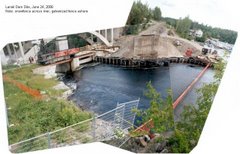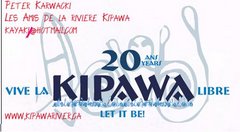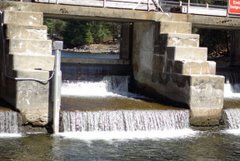Friday, February 24, 2012
Monday, February 20, 2012
Kipawa River Website Updated
Les Amis de la riviere Kipawa has updated its website. Its new and improved.
Please check it out.
Kipawa River
Please check it out.
Kipawa River
Stephen Harper wages war on environmental activists
http://www.straight.com/article-607641/vancouver/harper-wages-war-environmental-activists
Stephen Harper wages war on environmental activists opposing Northern
Gateway Pipeline Project
Vancouver protesters gathered outside Science World to air their
concerns during a recent visit by Prime Minister Stephen Harper. -
Stephen Thomson photo
Why won’t the prime minister shut up and allow the regulator to do its job?
By Matthew Kalkman, February 16, 2012
Sometimes I feel like I am in a terrible nightmare and I can’t wake up.
I had that feeling again when I read the story about fellow citizens
being labelled by a Prime Minister’s Office official as “enemies of the
government of Canada” solely for the issues they had with our
government’s environmental policy. This nightmare only continued with
the release of secret memos branding aboriginal communities as
“adversaries” in the Enbridge pipeline debate, and took on global
proportions when the attacks persisted during Prime Minister Stephen
Harper’s trip to China. I gave myself a pinch, and yet still found I was
in a country that was more and more difficult to recognize as the
progressive Canada we all felt we inhabited. We now see Harper’s attack
machine—which mastered its tactics against former Liberal leaders like
Michael Ignatieff and Stéphane Dion—being pointed at Canadian citizens
who care about having an honest discussion on our environment. This has
become all too Orwellian.
The federal government empowered a Joint Review Panel under the Canadian
Environmental Assessment Act and the National Energy Board Act to rule
on the proposed Northern Gateway Pipeline Project. Enbridge hopes to
build two 1,177-kilometre pipelines between Alberta and Kitimat to
facilitate the export of oil to Asia.
The PMO’s criticism of environmental groups that are intervenors in the
regulatory process of the pipeline hinders the integrity of the process
itself. It also calls into question the ability of charitable
foundations, which fund intervenors, to have views that differ from the
Harper government. This is failed leadership.
The government should not be meddling in the jurisdiction of the
regulator, which was created to ensure arm’s-length decision-making on
the environmental-review process. Moreover, the very fact that Harper
has not taken seriously the responsibility to consult with aboriginal
communities will certainly cause legal tension in the future, with the
Save the Fraser Declaration having already built a wall of opposition to
the pipeline.
The purpose of setting up the Joint Review Panel process was to make
sure that the decision would focus on what is best for the country, and
not on what is best for the special-interest groups supporting Harper’s
reelection. For the regulatory process to work effectively, it must be
able to make conclusions that are free from government interference.
Within the realm of judicial independence—and the Joint Review Panel is
a quasijudicial tribunal—former Supreme Court of Canada chief justice
Brian Dickson stated the law very clearly in the case of R. v. Beauregard:
“Historically, the generally accepted core of the principle of judicial
independence has been the complete liberty of individual judges to hear
and decide the cases that come before them: no outsider—be it
government, pressure group, individual or even another judge—should
interfere in fact, or attempt to interfere, with the way in which a
judge conducts his or her case and makes his or her decision.”
This interference by the PMO has led three nonprofit environmental
organizations to file a motion with the panel asking to “determine if
recent statements by the Prime Minister or by the Minister of Natural
Resources who is responsible for the National Energy Board constitute an
attempt by those Ministers to undermine or have had the effect of
undermining the Panel hearing process”. One can only hope that this
regulatory body—which is headquartered in the same city Stephen Harper
represents in Parliament—can make a decision without fear of having it
overturned at the cabinet table.
This attack is only the beginning of the assault on the
environmental-assessment process, and a continuance of Canada’s
withdrawal of leadership on the environment. What is our country’s plan
on climate change, now that Harper has pulled us out of Kyoto? The
answer is that we have no plan. My time as a delegate at the United
Nations Climate Change Conference in Copenhagen led me to the
realization that our government has completely ignored the long-term
threats to our country.
This inspired me to write the book New Liberalism, which calls for the
adoption of what I call “timeless freedom”. This is the notion that we
must preserve the freedom we enjoy today for future generations. Through
no effort of our own, we were born into the most fortunate of
circumstances, and we have a moral obligation to ensure that same level
of freedom for our children and grandchildren.
Our next progressive government must make it a priority to bring forward
a new politics of sustainability and intergenerational equity. This
means we have to tackle climate change, the growing debt and deficits,
and the growing inequalities in our society to enable a better future
for all Canadians. The first step is to ensure the independence of our
regulatory decision makers.
Matthew Kalkman is a recent graduate of the London School of Economics
and is working as an intern at a nonprofit environmental legal organization.
--
Jamie Kneen, Communications & Outreach Coordinator, MiningWatch Canada
http://www.miningwatch.ca/
Stephen Harper wages war on environmental activists opposing Northern
Gateway Pipeline Project
Vancouver protesters gathered outside Science World to air their
concerns during a recent visit by Prime Minister Stephen Harper. -
Stephen Thomson photo
Why won’t the prime minister shut up and allow the regulator to do its job?
By Matthew Kalkman, February 16, 2012
Sometimes I feel like I am in a terrible nightmare and I can’t wake up.
I had that feeling again when I read the story about fellow citizens
being labelled by a Prime Minister’s Office official as “enemies of the
government of Canada” solely for the issues they had with our
government’s environmental policy. This nightmare only continued with
the release of secret memos branding aboriginal communities as
“adversaries” in the Enbridge pipeline debate, and took on global
proportions when the attacks persisted during Prime Minister Stephen
Harper’s trip to China. I gave myself a pinch, and yet still found I was
in a country that was more and more difficult to recognize as the
progressive Canada we all felt we inhabited. We now see Harper’s attack
machine—which mastered its tactics against former Liberal leaders like
Michael Ignatieff and Stéphane Dion—being pointed at Canadian citizens
who care about having an honest discussion on our environment. This has
become all too Orwellian.
The federal government empowered a Joint Review Panel under the Canadian
Environmental Assessment Act and the National Energy Board Act to rule
on the proposed Northern Gateway Pipeline Project. Enbridge hopes to
build two 1,177-kilometre pipelines between Alberta and Kitimat to
facilitate the export of oil to Asia.
The PMO’s criticism of environmental groups that are intervenors in the
regulatory process of the pipeline hinders the integrity of the process
itself. It also calls into question the ability of charitable
foundations, which fund intervenors, to have views that differ from the
Harper government. This is failed leadership.
The government should not be meddling in the jurisdiction of the
regulator, which was created to ensure arm’s-length decision-making on
the environmental-review process. Moreover, the very fact that Harper
has not taken seriously the responsibility to consult with aboriginal
communities will certainly cause legal tension in the future, with the
Save the Fraser Declaration having already built a wall of opposition to
the pipeline.
The purpose of setting up the Joint Review Panel process was to make
sure that the decision would focus on what is best for the country, and
not on what is best for the special-interest groups supporting Harper’s
reelection. For the regulatory process to work effectively, it must be
able to make conclusions that are free from government interference.
Within the realm of judicial independence—and the Joint Review Panel is
a quasijudicial tribunal—former Supreme Court of Canada chief justice
Brian Dickson stated the law very clearly in the case of R. v. Beauregard:
“Historically, the generally accepted core of the principle of judicial
independence has been the complete liberty of individual judges to hear
and decide the cases that come before them: no outsider—be it
government, pressure group, individual or even another judge—should
interfere in fact, or attempt to interfere, with the way in which a
judge conducts his or her case and makes his or her decision.”
This interference by the PMO has led three nonprofit environmental
organizations to file a motion with the panel asking to “determine if
recent statements by the Prime Minister or by the Minister of Natural
Resources who is responsible for the National Energy Board constitute an
attempt by those Ministers to undermine or have had the effect of
undermining the Panel hearing process”. One can only hope that this
regulatory body—which is headquartered in the same city Stephen Harper
represents in Parliament—can make a decision without fear of having it
overturned at the cabinet table.
This attack is only the beginning of the assault on the
environmental-assessment process, and a continuance of Canada’s
withdrawal of leadership on the environment. What is our country’s plan
on climate change, now that Harper has pulled us out of Kyoto? The
answer is that we have no plan. My time as a delegate at the United
Nations Climate Change Conference in Copenhagen led me to the
realization that our government has completely ignored the long-term
threats to our country.
This inspired me to write the book New Liberalism, which calls for the
adoption of what I call “timeless freedom”. This is the notion that we
must preserve the freedom we enjoy today for future generations. Through
no effort of our own, we were born into the most fortunate of
circumstances, and we have a moral obligation to ensure that same level
of freedom for our children and grandchildren.
Our next progressive government must make it a priority to bring forward
a new politics of sustainability and intergenerational equity. This
means we have to tackle climate change, the growing debt and deficits,
and the growing inequalities in our society to enable a better future
for all Canadians. The first step is to ensure the independence of our
regulatory decision makers.
Matthew Kalkman is a recent graduate of the London School of Economics
and is working as an intern at a nonprofit environmental legal organization.
--
Jamie Kneen, Communications & Outreach Coordinator, MiningWatch Canada
http://www.miningwatch.ca/
Subscribe to:
Comments (Atom)
Useful Links
- Mount Gox - Bitcoin exchange
- Reggie Middleton's Rapier Analysis
- Ontario Rivers Alliance
- Geodesic Dome Construction
- Canadian Disaster Preparedness
- Globe and Mail
- Chris' The Weekly Telegram
- Michael Rupert of CollapseNet
- Max Keiser
- Nicole Foss Blog - the automatic earth
- Peak Moment Discussions
- Scotia Mocatta Bullion Store
- Dimitry Orlov - Peak Moment Discussions
- Jims's ISFCR Blog
- Jenny Right Side Blog
- Scott Sorensen
Alternative Energy Sites I like
The Queen is not amused!

http://www.ispeakforcanadianrivers.ca/
The Ashlu river: it could happen to you

Whitewater Ontario

Working Hard to Protect Canada's Paddling Resources
Whitewater Ontario - Mission Statement
It is Whitewater Ontario’s mission to support the whitewater paddling community through the promotion, development and growth of the sport in its various disciplines.
We accomplish this through the development of events, resources, clubs, and programs for personal and athletic development, regardless of skill level or focus, to ensure a high standard of safety and competency;
We advocate safe and environmentally responsible access and use of Ontario’s rivers.
Whitewater Ontario is the sport governing body in the province, and represents provincial interests within the national body Whitewater Canada and the Canadian Canoe Association
http://www.whitewaterontario.ca/page/mission.asp
Kipawa, Tabaret, and Opemican
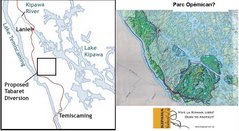
If Hydro Quebec is not actively pursuing Tabaret what is that bite out of Opemican for?
Kipawa Dam: After

Laniel Dam at 2006 Rally
Where is the Kipawa
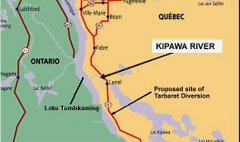
Kipawa flows into lake Temiskamingue, running from Kipawa Lake, under hwy 101 in Quebec
Kipawa Dam

laniel dam at 2004 River Rally
Tabaret is a Bad Idea
About the Kipawa
The best thing paddlers can do to help the cause of the Kipawa:
1. attend the rally and bring others including non paddlers to attend and buy beer and have fun
2. write your MP /MNA and raise the issue and post your objections -1 letter = 200 who didn't write
3. Write Thierry Vandal the CEO of Hydro Quebec strongly opposing the 132 MW standard decrying the use of "diversion" as the most environmentally inappropriate method of power production
4. Write Jean Charest, Premier of Quebec protesting that either the algonquin or the tabaret project will eliminate all other values on the Kipawa River by turning it into a dry gulch.
5. See if you can get other allied groups interested by showing your own interest, ie the Sierra Defense Fund, Earthwild, MEC, and so on.
6. Demand further consultation
7. Currently we are at the point where we need to sway public opinion and raise awareness.
However, if all else fails, don't get mad, simply disrupt, foment, and protest . The Monkey Wrench Gang.
Have you read Edward Abbey?
Important Addresses
CEO,Hydro Québec, 75 boul René Levesque, Montreal, P.Q., H2Z 1A4Caille.andre@hydro.qc.ca
The best thing paddlers can do to help the cause of the Kipawa:
1. attend the rally and bring others including non paddlers to attend and buy beer and have fun
2. write your MP /MNA and raise the issue and post your objections -1 letter = 200 who didn't write
3. Write Thierry Vandal the CEO of Hydro Quebec strongly opposing the 132 MW standard decrying the use of "diversion" as the most environmentally inappropriate method of power production
4. Write Jean Charest, Premier of Quebec protesting that either the algonquin or the tabaret project will eliminate all other values on the Kipawa River by turning it into a dry gulch.
5. See if you can get other allied groups interested by showing your own interest, ie the Sierra Defense Fund, Earthwild, MEC, and so on.
6. Demand further consultation
7. Currently we are at the point where we need to sway public opinion and raise awareness.
However, if all else fails, don't get mad, simply disrupt, foment, and protest . The Monkey Wrench Gang.
Have you read Edward Abbey?
Important Addresses
CEO,Hydro Québec, 75 boul René Levesque, Montreal, P.Q., H2Z 1A4Caille.andre@hydro.qc.ca
Tabaret is a Bad Idea (Part Two)
Les Amis de la Riviere Kipawa is poised to use an application to the Federal Court to issue a Writ of Mandamus to ensure the Minster does what he is supposed to do, protect the public's right to navigate the water control structure at Laniel, Quebec using the Navigable Waters Protection Act. (see http://www.kipawariver.ca/)
In the now gutted Navigable Waters Protection Act lay the means by which the Minister of Transport could keep the public right of passage down our great Canadian Heritage, our rivers and streams which are threatened especially by resource corporations and power brokers such as Hydro Quebec.
These powerful entities continue to petition that 'this' river or 'that' stream is not navigable and therefore not protectable.
I don't say that dams and bridges should not be built, only that if they are, historical navigation rights should be considered and preserved by making reasonable accommodations for recreational boaters.
It is the Minister of Transport, in exercising the right to allow or disallow work on or over a navigable waterway is what keeps boats and recreational boaters plying our waterways.
To many recent cases launched in the Federal Court concerning the Navigable Waters Protection Act, most recently the case of the Humber Environment Group of Cornerbrook Newfoundland versus the Cornerbrook Pulp and Paper Company indicates that the important oversight is not being faithfully performed. Have we really come to the point now where we must say "such and such a stream is one foot deep, possessing so many cubic feet per second flow and so on?" The answer to this is... YES!
The honourable Mr. Justice John A. O'Keefe, ruled that it had not been shown that the river was navigable. How convenient was that to the Minister? But either the Minister of Transport acts to protect our rivers and streams as a public right or he does not and that means rivers and streams currently enjoyed by kayakers and canoists.
Enough of the cheating, and double-talk. Canadians! our rivers and streams are our own, lets urge the Minister of Transport and the our government to protect them.
Peter Karwacki
In the now gutted Navigable Waters Protection Act lay the means by which the Minister of Transport could keep the public right of passage down our great Canadian Heritage, our rivers and streams which are threatened especially by resource corporations and power brokers such as Hydro Quebec.
These powerful entities continue to petition that 'this' river or 'that' stream is not navigable and therefore not protectable.
I don't say that dams and bridges should not be built, only that if they are, historical navigation rights should be considered and preserved by making reasonable accommodations for recreational boaters.
It is the Minister of Transport, in exercising the right to allow or disallow work on or over a navigable waterway is what keeps boats and recreational boaters plying our waterways.
To many recent cases launched in the Federal Court concerning the Navigable Waters Protection Act, most recently the case of the Humber Environment Group of Cornerbrook Newfoundland versus the Cornerbrook Pulp and Paper Company indicates that the important oversight is not being faithfully performed. Have we really come to the point now where we must say "such and such a stream is one foot deep, possessing so many cubic feet per second flow and so on?" The answer to this is... YES!
The honourable Mr. Justice John A. O'Keefe, ruled that it had not been shown that the river was navigable. How convenient was that to the Minister? But either the Minister of Transport acts to protect our rivers and streams as a public right or he does not and that means rivers and streams currently enjoyed by kayakers and canoists.
Enough of the cheating, and double-talk. Canadians! our rivers and streams are our own, lets urge the Minister of Transport and the our government to protect them.
Peter Karwacki
Tabaret is a Bad Idea (Part Three)
10 Reasons WhyTabaret is a Bad Idea1) Tabaret is too big. The station is designed to useevery drop of water available in the Kipawawatershed, but will run at only 44 percent capacity.We believe the Tabaret station is designed to usewater diverted from the Dumoine River into theKipawa watershed in the future.
2) The Tabaret project will eliminate the aquaticecosystem of the Kipawa River.The Tabaret project plan involves the diversion of a16-km section of the Kipawa River from its naturalstreambed into a new man-made outflow from LakeKipawa.
3) Tabaret will leave a large industrial footprint on thelandscape that will impact existing tourismoperations and eliminate future tourism potential.
4) The Tabaret project is an aggressive single-purposedevelopment, designed to maximize powergeneration at the expense of all other uses.
5) River-diversion, such as the Tabaret project, takinglarge amounts of water out of a river’s naturalstreambed and moving it to another place, is verydestructive to the natural environment.
6) The Kipawa River has been designated a protectedgreenspace in the region with severe limitations ondevelopment. This designation recognizes theecological, historical and natural heritage value ofthe river and the importance of protecting it.Tabaret will eliminate that value.
7) If necessary, there are other, smarter and morereasonable options for producing hydro power onthe Kipawa watershed. It is possible to build a lowimpactgenerating station on the Kipawa river, andmanage it as a “run-of-the-river” station, makinguse of natural flows while maintaining other values,with minimal impact on the environment.
8) The Kipawa watershed is a rich natural resource forthe Temiscaming Region, resonably close to largeurban areas, with huge untapped potential fortourism and recreation development in the future.Tabaret will severely reduce this potential.
9) Tabaret provides zero long-term economic benefitfor the region through employment. The plan is forthe station to be completely automated andremotely operated.
10) The Kipawa River is 12,000 years old. The riverwas here thousands of years before any peoplecame to the region. The Tabaret project will change all that.
Problems on a local River?
- There is more to do as well but you have to do your research and above all, don't give up.
- IN the meantime prepared a document itemizing the history of navigation of this spot and its recreational value. Use the Kipawa river history of navigation as a guide: see www.kipawariver.ca
- Under the Ministry of Environment guidelines you have a set period of time to petition the change under the environmental bill of rights, you may have limited time to take this action. But it involves going to court for a judicial review of the decision.
- 4. contact the ministry of natural resources officials and do the same thing.
- 3. contact the ministry of the environment and determine if they approved the project
- 2. determine if the dam was a legal dam, approved under the navigable waters protection act.
- 1. research the decision and timing of it to determine if an environmental assessment was done.
Minden Ontario
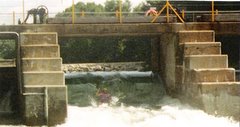
Gull River Water control at Horseshoe lake
A History of Navigation on the Kipawa River
Prior to the environmental assessment there was no signage at the Laniel Dam
T-Shirts Area: These are available now!

Send $25 and a stamped self addressed envelop for the Tshirt, and for the bumper sticker, a stamped and self addressed envelope with $5.00 for the bumper sticker to Les Amis de la rivière Kipawa, 80 Ontario St., Ottawa, Ontario, K1K 1K9 or click the link To purchase a Les Amis "T" contact Doug with the following information: Number of shirts:Sizes: Ship to Address: Method of Payment: cash, cheque and paypal, Shipto address:
Bumper Stickers Now Available

Get your bumper sticker and show your support for the Kipawa Legal Fund ! - send $5.00 in a Stamped, self addressed envelope to: Peter Karwacki Box 39111, Ottawa, Ontario, Canada, K1H 7X0


